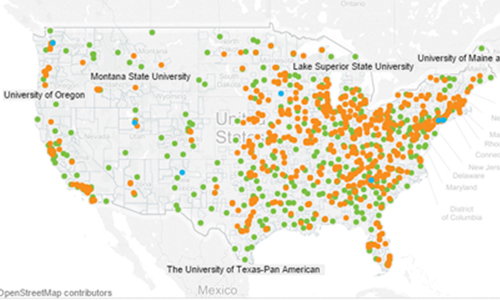

Modeling student test-taking motivation in the context of an adaptive achievement test
This study examined the utility of response time-based analyses in understanding the behavior of unmotivated test takers. For an adaptive achievement test, patterns of observed rapid-guessing behavior and item response accuracy were compared to the behavior expected under several types of models that have been proposed to represent unmotivated test taking behavior.
Topics: Measurement & scaling, Growth modeling, School & test engagement


Get it right: Common sense on the common core
In this podcast, Nate Jensen discusses the value of assessments aligned to the Common Core State Standards and the misconceptions that accompanied the implementation of new assessments in some states.
Learning First Alliance, Get It Right podcast


Concurrent validity of the independent reading level assessment framework and a state assessment
This study investigates the use of screening assessments within the increasingly popular Response to Intervention (RTI) framework, specifically seeking to collect concurrent validity evidence on one potential new screening tool, the Independent Reading Level Assessment (IRLA) framework.
By: Beth Tarasawa, Nicole Ralston, Jacqueline Waggoner, Amy Jackson
Topics: Empowering educators, Measurement & scaling, Reading & language arts


Students improve even amid evaluation controversy
Positive student achievement and growth results for students in New York suggest that improvements to the teacher evaluation process that emphasize the importance of strong evaluation procedures, the systematic collection of evidence of teacher performance, and the use of data to inform the process, have promise for improving educator effectiveness far more than a narrower punitive approach.


Modeling student test-taking motivation in the context of an adaptive achievement test
This study examined the utility of response time‐based analyses in understanding the behavior of unmotivated test takers. For the data from an adaptive achievement test, patterns of observed rapid‐guessing behavior and item response accuracy were compared to the behavior expected under several types of models that have been proposed to represent unmotivated test taking behavior.
Topics: Innovations in reporting & assessment, Measurement & scaling, School & test engagement


Are all biases bad? Collaborative grounded theory in developmental evaluation of education policy
By: Ross Anderson, Meg Guerreiro, Jo Smith


Mapping the road to college with the College Explorer tool
NWEA recently launched a new tool called College Explorer that enables middle school and early high school-age students to use their Measures of Academic Progress ® (MAP®) scores to see which colleges and universities they’re on track to enter long before they embark on the college application process.
By: Greg King
Topics: Innovations in reporting & assessment, College & career readiness, High school


